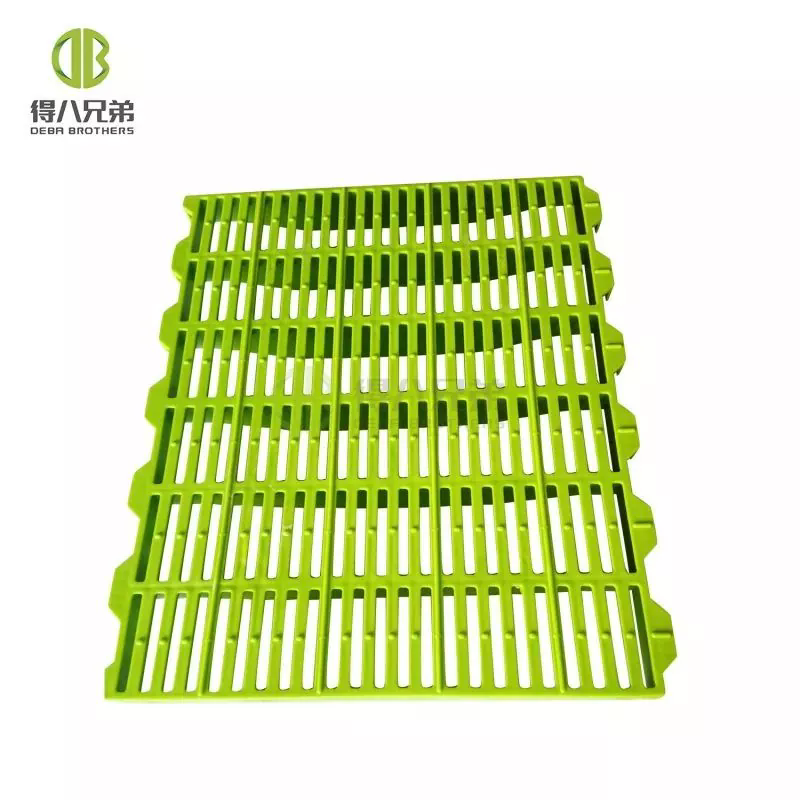Everything You Need to Know About Plastic Slats for Pigs
2024-10-22
Plastic slats have become an essential part of modern pig farming due to their durability, hygiene, and animal welfare benefits. In this blog, we answer common questions to help you understand why plastic slats are a great investment for pig farms.
1. What are plastic slats for pigs?
Plastic slats are flooring systems designed for pig pens. They consist of panels with narrow gaps that allow waste to pass through, keeping the pen dry and clean. These slats are commonly used in farrowing, nursery, and fattening pens, ensuring healthy and hygienic conditions for pigs.
2. What are the benefits of using plastic slats in pig farming?
Plastic slats offer several advantages over traditional flooring materials, such as concrete or wood:
Hygiene: Waste passes through the slats, minimizing contact with animals and reducing disease risks.
Durability: Plastic is corrosion-resistant and doesn't degrade from moisture or cleaning agents.
Comfort: Smooth surfaces prevent injuries, and plastic retains moderate temperatures, keeping pigs comfortable.
Easy to clean: The panels are resistant to high-pressure washing and disinfectants.
Reduced labor costs: Less time is required for cleaning and maintenance.
3. Are plastic slats safe for piglets and sows?
Yes. Plastic slats are specifically designed to meet the needs of pigs at different life stages.
For piglets: Slats with narrower gaps prevent small hooves from slipping through, reducing injuries.
For sows: Heavy-duty plastic slats are reinforced to support larger animals, ensuring they are stable and safe even during farrowing.
Additionally, non-slip textures on the surface provide extra grip, preventing slips and falls.
4. What types of plastic slats are available?
There are different types of plastic slats designed for various purposes:
Farrowing slats: Used for sows and piglets, often with mixed sections (plastic for piglets and cast iron for sows).
Nursery slats: These have smaller gaps to protect young pigs.
Finishing slats: Built to withstand the weight of adult pigs during fattening stages.
Heavy-duty slats: Reinforced to support large sows or boars.
Some slats are modular and come with options for integrated heating systems, which help keep piglets warm in the early stages of life.
5. How do I install plastic slats for pig pens?
Installation usually involves the following steps:
1. Prepare the foundation: Ensure the base structure is level and stable.
2. Lay support beams or frames: These frames hold the slats securely.
3. Fit the plastic slats: Modular slats fit together like puzzle pieces, locking in place.
4. Ensure proper drainage: The flooring system should lead to a waste collection area, such as a pit or gutter, to maximize cleanliness.
Many manufacturers provide installation guides or even offer installation services.
6. How long do plastic slats last?
Plastic slats are highly durable and can last up to 10 years or more with proper maintenance. Their lifespan depends on the quality of the material, frequency of use, and cleaning routines.
High-quality plastic slats resist wear and tear from pigs' hooves, moisture, and exposure to disinfectants.
7. How do I maintain plastic slats?
Maintenance is relatively simple. Here are a few tips:
Daily cleaning: Remove visible waste to keep the floor hygienic.
Weekly washing: Use high-pressure washers to clean the slats thoroughly.
Disinfect regularly: This helps prevent the spread of disease.
Inspect for damage: Check for cracks or loose slats and replace them if necessary.
8. Are plastic slats more expensive than traditional flooring?
While the initial investment in plastic slats may be higher than concrete or wood, the long-term savings make them cost-effective. Plastic slats last longer, reduce cleaning costs, and improve pig health, leading to better productivity and lower veterinary bills.
9. Where can I buy plastic slats for pig farming?
Plastic slats are available from agricultural suppliers, both online and offline. Many manufacturers offer custom solutions based on your pen design and specific needs. It’s recommended to compare different options for quality, pricing, and warranties before purchasing.
10. Are plastic slats eco-friendly?
Yes, many plastic slats are made from recycled plastic materials. Additionally, their durability and ease of cleaning reduce the need for harsh chemicals, making them an environmentally friendly option. At the end of their lifespan, some slats can also be recycled, further reducing waste.
Conclusion
Plastic slats have become an essential element in modern pig farming, improving hygiene, reducing labor, and promoting animal welfare. With proper installation and maintenance, these slats can serve as a long-term, cost-effective solution for your farm.
If you’re looking for a reliable way to keep your pigs healthy and comfortable, investing in plastic slats is a smart choice.



